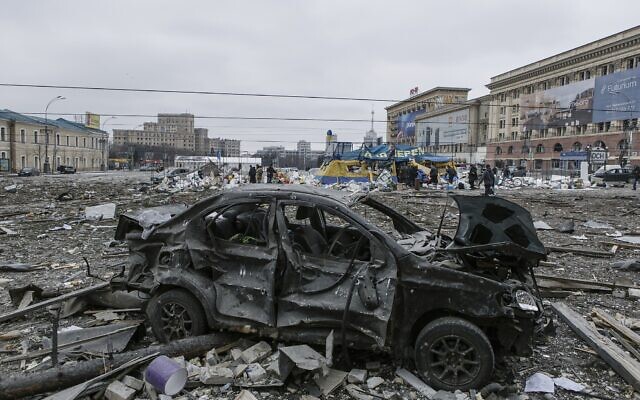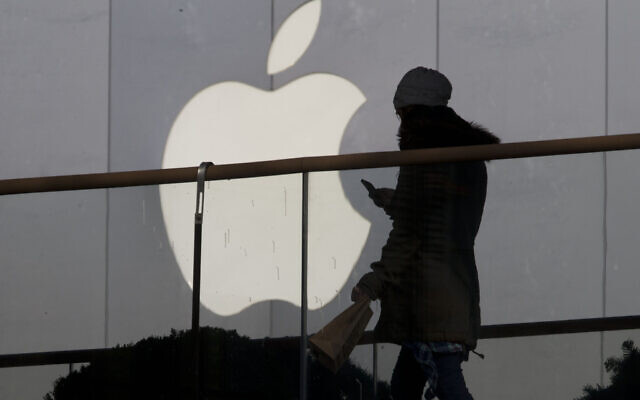Ukraine has effectively asked that Russia be kicked off the internet, but the request was rejected by a regional authority.
In a letter sent Monday to the president of the Internet Corporation for Assigned Names and Numbers, Ukraine’s deputy minister for digital transformation, Mykhailo Fedorov, cited the “atrocious crimes” of Russia’s invasion, including its alleged breach of the Geneva Conventions in attacking civilian targets.
Federov said the crimes “have been made possible mainly due to the Russian propaganda machinery” and cited cyberattacks “from the Russian side” that have impeded the ability of Ukrainians and their government to communicate.
Federov asked that ICANN revoke, permanently or temporarily, the domains .ru and .su and shut down the root servers in Moscow and St. Petersburg that match domain names and numbers.
“Russian citizens must feel the cost of war,” government spokesperson Oleksandr Ryzhenko said Tuesday.
ICANN had no immediate comment but the regional internet naming authority for Europe and the former Soviet Union, RIPE NCC, rejected the request.

A view of the central square following shelling of the City Hall building in Kharkiv, Ukraine, March 1, 2022. (AP Photo/Pavel Dorogoy)
In an email to members, RIPE’s executive board said it believes “the means to communicate should not be affected by domestic political disputes, international conflicts or war.”
Kicking Russia off the internet would be an annoyance to Russian hackers but it wouldn’t stop them since they could still use different top-level internet domains. But it would badly isolate the Russian public from international discourse.
Apple halt
Meanwhile, tech giant Apple announced Tuesday a halt in all product sales in Russia, the latest fallout over Moscow’s invasion of Ukraine after Kyiv asked for Russia to be booted from the internet entirely.
Western governments, sporting organizations and big companies have cut Russia off or dealt it punishing sanctions over the internationally condemned attack on its neighbor.

Illustrative: In this December 23, 2013 file photo, a woman using a phone walks past Apple’s logo near its retail outlet in Beijing. (AP Photo/Ng Han Guan, File)
“We have paused all product sales in Russia. Last week, we stopped all exports into our sales channel in the country,” said an Apple statement.
The iPhone maker also announced Apple Pay and other services have been limited, while Russian state-owned media RT and Sputnik news apps were no longer available for download outside Russia.
“We are deeply concerned about the Russian invasion of Ukraine and stand with all of the people who are suffering as a result of the violence,” the statement said.
“We are supporting humanitarian efforts, providing aid for the unfolding refugee crisis,” it added.
Ukraine’s defiant government, which has urged its people to battle Russian forces, has asked for help from all quarters, including Apple’s CEO Tim Cook.
“I appeal to you… to stop supplying Apple services and products to the Russian Federation, including blocking access to the Apple Store!” Ukraine’s digital minister Mykhailo Fedorov wrote in a letter he posted to Twitter Friday.
Tech platforms pulled into conflict
Apple also said that it has disabled both traffic and “live incidents” in Apple Maps in Ukraine as a safety measure for Ukrainian citizens.
“We will continue to evaluate the situation and are in communication with relevant governments on the actions we are taking. We join all those around the world who are calling for peace,” the Apple statement said.
The announcement came just as the European Union banned Russian RT and Sputnik from broadcasting in the bloc while banning “certain” Russian banks from the SWIFT bank messaging system.

People stand in line to withdraw money from an ATM of Alfa Bank in Moscow, Russia, February 27, 2022. (AP/Victor Berzkin)
Tech firms from Facebook to TikTok and Microsoft had already moved to curb the reach of Russian state-linked news outlets, which stand accused of pushing misinformation about Moscow’s invasion of Ukraine.
Social media platforms have become one of the fronts in the attack, home to sometimes false narratives but also real-time monitoring of a conflict that marks Europe’s biggest geopolitical crisis in decades.
Facebook’s parent Meta said Monday it would be restricting access in the European Union to RT and Sputnik.
Video sharing app TikTok told AFP it had restricted Russian state-owned media access on its platform in the EU, while Microsoft said it was removing RT from its app store and would change its search engine Bing’s algorithm to shift RT and Sputnik content to lower in results.
Twitter and Facebook have both been hit with access restrictions in Russia since the invasion of Ukraine and are now “largely unusable,” said web monitoring group NetBlocks.





